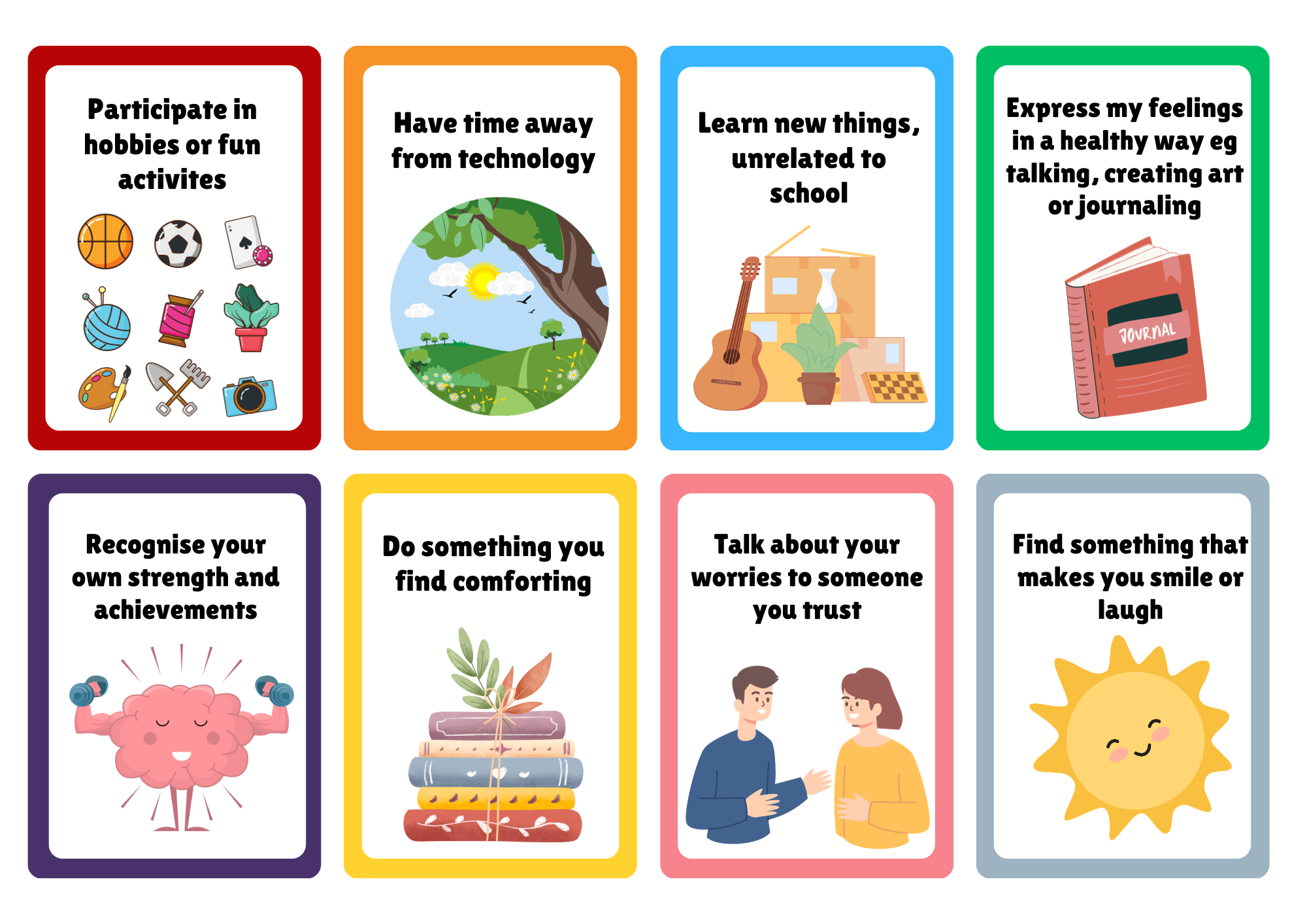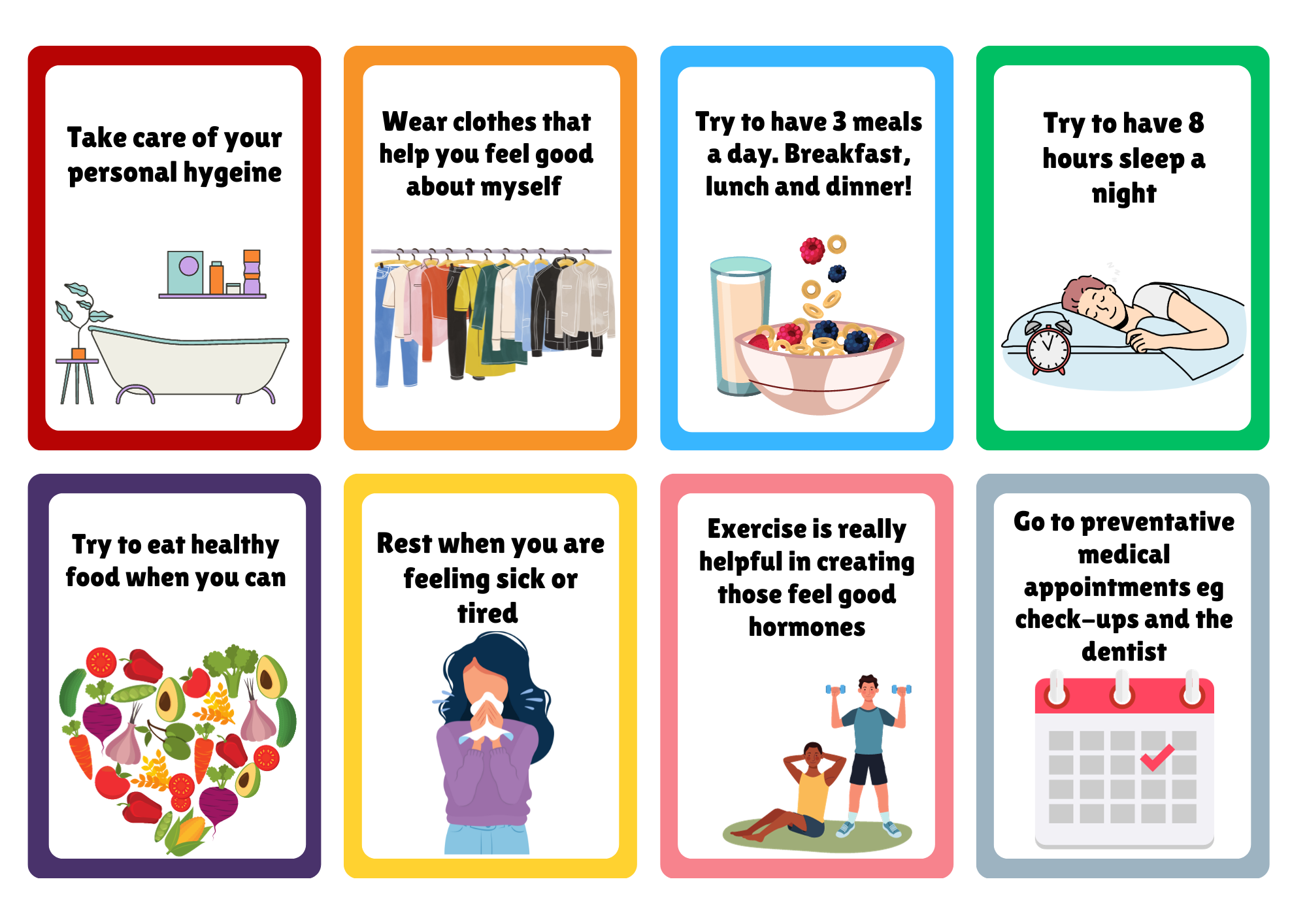Self-care strategies
It's not always easy to take the best care of ourselves for many reasons: maybe you don't feel there's enough time or you have too many things to think about, but this page highlights many things we can all try to do to help keep ourselves healthy.
There are self-care flashcards, which you can print out and use as reminders or prompts to practice different types of self-care.
Emotional self-care

- Spend time with people who I like
- Meet new people
- Ask others for help, when needed
- Keep in touch with old friends
- Say “no” to excessive new responsibilities
- Find reasons to laugh
- Spend time in nature
- Recognise the things that give meaning to my life
- Act in accordance with my morals and values
- Set aside time for thought and reflection
- Participate in a cause that is important to me or stand up for other people
- Appreciate art that is impactful to me eg music, film, literature
Create a "Hope Box"
Fill a box or bag of items that are meaningful to you and give you hope. It can also be a good idea to put in things that soothe your senses and help you to care for yourself. Self-care is not just necessary, it is essential.
It is a good idea to include things that help to keep you distracted if you are experiencing distressing thoughts. Decorate your box as you wish – get creative! If you can’t put the item in the bag or box, then use a reminder of the item in the form of a picture.
We’ve put together some example of things you could include but feel free to add anything that helps you.





Physical self-care

Helping to manage your appetite
When you’re low in mood or feeling particularly anxious we know that it can affect appetite. Fuelling and nourishing your body so that you have the energy for everyday tasks and to work through emotional difficulties is really important.
Here are some tips to help you manage your appetite:
- You wouldn’t expect a car to run without petrol, so try to think of food as your fuel to keep going
- Don’t be afraid to ask for help preparing a meal
- Try to stick to a routine of three meals a day and two or three snacks
- Try to keep busy during the day so that you can help yourself to build up an appetite towards mealtimes
- Don’t wait for hunger to alert you to eat, you may need to eat even when you are not hungry
- If you’re really struggling to manage food, try milkshakes or smoothies
- Wholesome, nutritiously rich food will help to nourish your body and your mind
- Restricting food will increase the symptoms of depression and anxiety
- If you find eating larger meals hard, try eating four or five smaller meals throughout the day
- Keep things in stock that you enjoy and that take little effort to prepare
- When you eat, try to eat mindfully, noticing the taste, texture and smell of the food
- Try eating with people rather than on your own
- Why not put some music on during a meal?
- Some people find it helpful to view food as a medicine
- Try to keep busy after meals, maybe watch some TV, play a game or go for a walk
We know that when you are experiencing emotional difficulties your sleep can really be affected. Getting less sleep means you may be less able to deal with these difficulties in a rational way so we’ve asked some other people who have struggled with sleep for some suggestions as to what helped them. See what works for you.
Avoid screens before bed - Electronic devices emit ‘blue light’ and this stops the production of our natural sleep hormone. Try to avoid screens two hours before bed. Or switch your device to night mode and reduce the screen brightness.
Environment:
- Ensure your bedroom is a place you would like to fall asleep in. A quick tidy-up, some clean sheets, and a cozy bed is a good place to start
- Make your bedroom a place you just associate with sleeping
- Try to make sure your room is dark and quiet. Maybe think about using an eye mask and earplugs if needed
- If you’re struggling to sleep in your room, perhaps try another one if you can
Write down your worries - Try giving yourself a five-minute ‘worry time before you start your bedtime routine. Write down all the things on your mind and leave them on the paper.
Establish a bedtime routine - A routine may help you wind down your mind before sleep. A warm bath or shower with some relaxing music, a milky drink or camomile tea, with an easy-to-read book before bed is a good idea.
Take things easy - Don’t do any strenuous exercise two hours before bed, but some gentle yoga may help relax you.
Keep busy - Try to keep yourself as busy as you can with activities in the day to ensure you are tired at bedtime.
Try a talking book - Some people find a talking book helpful (sometimes it helps if it’s a boring one so you don’t stay awake to hear it!)
Bedtime playlist - Make yourself a bedtime playlist of music you find helpful to fall asleep to. Some people find instrumental music most helpful.
Avoid caffeine - Avoid caffeine four to six hours before going to bed.
Use grounding techniques - If you struggle with nightmares and find yourself awake, try a grounding technique to help calm you.
Relaxing sounds - You may find relaxing sounds such as waves may help you drift off.
If it's not working, get up - If you are struggling to go to sleep, try for about an hour. But if it’s not happening, get up, try reading for a bit and then return to bed. Do this as many times as needed. If you worry about not being able to sleep it’s less likely to happen.
Don't be alone - Don’t be afraid to wake someone else up in the house to be with you if you are struggling.
For further support regarding self-care, you can visit our other helpful organisations page.
Help us improve our website
Please take a moment to share your thoughts and help us enhance our website by completing our short survey here.